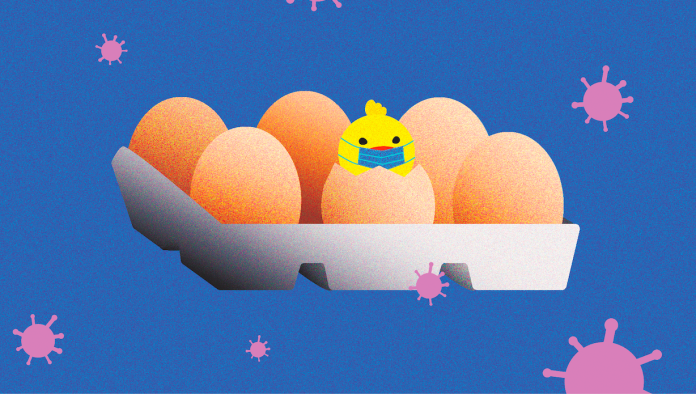Melanie Martinez
Science and Tech Co-Editor
One of the most prominent ingredients in breakfast cuisine has been absent from grocery store shelves. In recent weeks, eggs have been scarce and, when they are in stock, are wildly overpriced. Prior to the shortage, a dozen of eggs would cost around two dollars, but now they’re often six dollars or more. This increase in price and scarcity of eggs can likely be attributed to the spread of avian influenza within the factory farms where most eggs are produced.
The main culprit of the egg situation is more than likely to be avian influenza Type A, which has affected egg yield as well as price. The avian flu is a disease that is spread through domestic birds such as chickens and ducks. Through the infected waterfowls, poultry, and contaminated surfaces, avian flu is able to spread quickly, and widespread disease within bird populations could lead to high rates of illness and death. Due to how easily contagious the avian flu is, an outbreak can have a huge economic impact and trade restrictions.
This egg shortage follows the storms the UC Santa Barbara (UCSB) community just experienced, after which grocery stores were unable to receive more merchandise due to the intense weather conditions shutting down roads. UCSB students and Santa Barbara residents went from struggling to obtain groceries to dealing with extreme prices.
There are multiple factors that contribute to the increase in egg prices, with inflation being one of them. However, the 50 percent surge in egg prices has largely been due to the avian flu. The increase began after Thanksgiving and has only continued to rise since then. With the demand for eggs increasing simultaneously after the recent storms, it has been difficult to find eggs in any local stores.
The flu has decreased egg yield per chicken, which results in shortages within stores. Additionally, the limit on the number of eggs in grocery stores around the country was implemented to avoid any consumption of an infected egg. However, contraction of avian influenza by a human isn’t inherently dangerous, as contracting the disease can range in experiencing no symptoms to mild illness. In the cases where humans have gotten the avian flu, it was contracted through physical contact with the virus. In the case of egg consumption, the virus would be contracted by eating contaminated eggs.
Avian flu outbreaks aren’t a rare occurrence, but more of an uncommon one. Compared to the 2015 outbreak, the number of birds affected in 2023 is reaching similar numbers, but the number of states affected by this outbreak is double from 2015.
The avian flu has proven how interconnected our society and its supply chains are. UCSB students depend on the nearby stores in order to sustain themselves and when an item as important as eggs become overpriced and scarce, it can make cooking and meal-prepping difficult. Many circumstances have contributed to the egg shortage, but they should begin to level out as the weeks go on. Egg prices should return to normal in the coming months but, for now, the hunt for affordable eggs continues.











